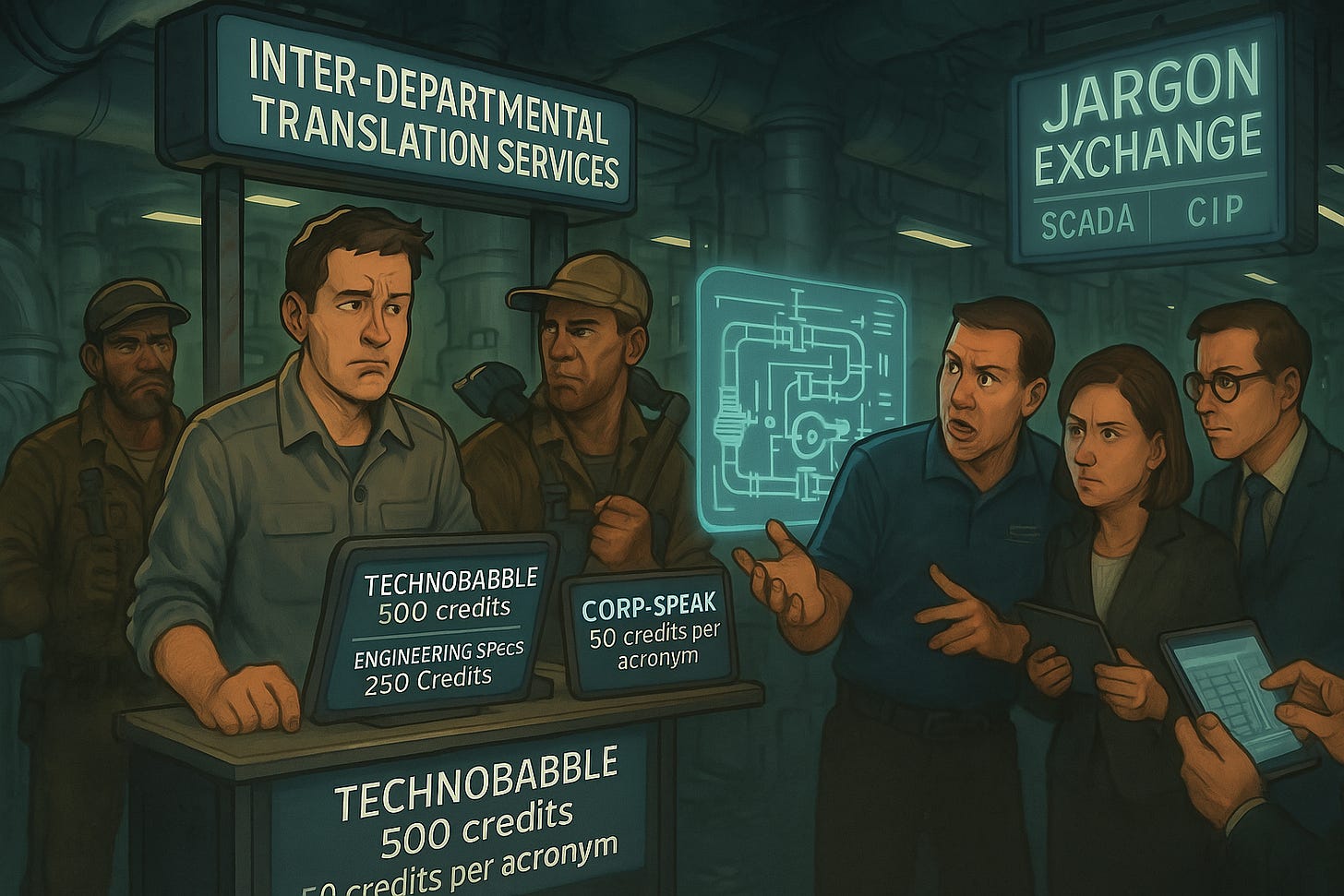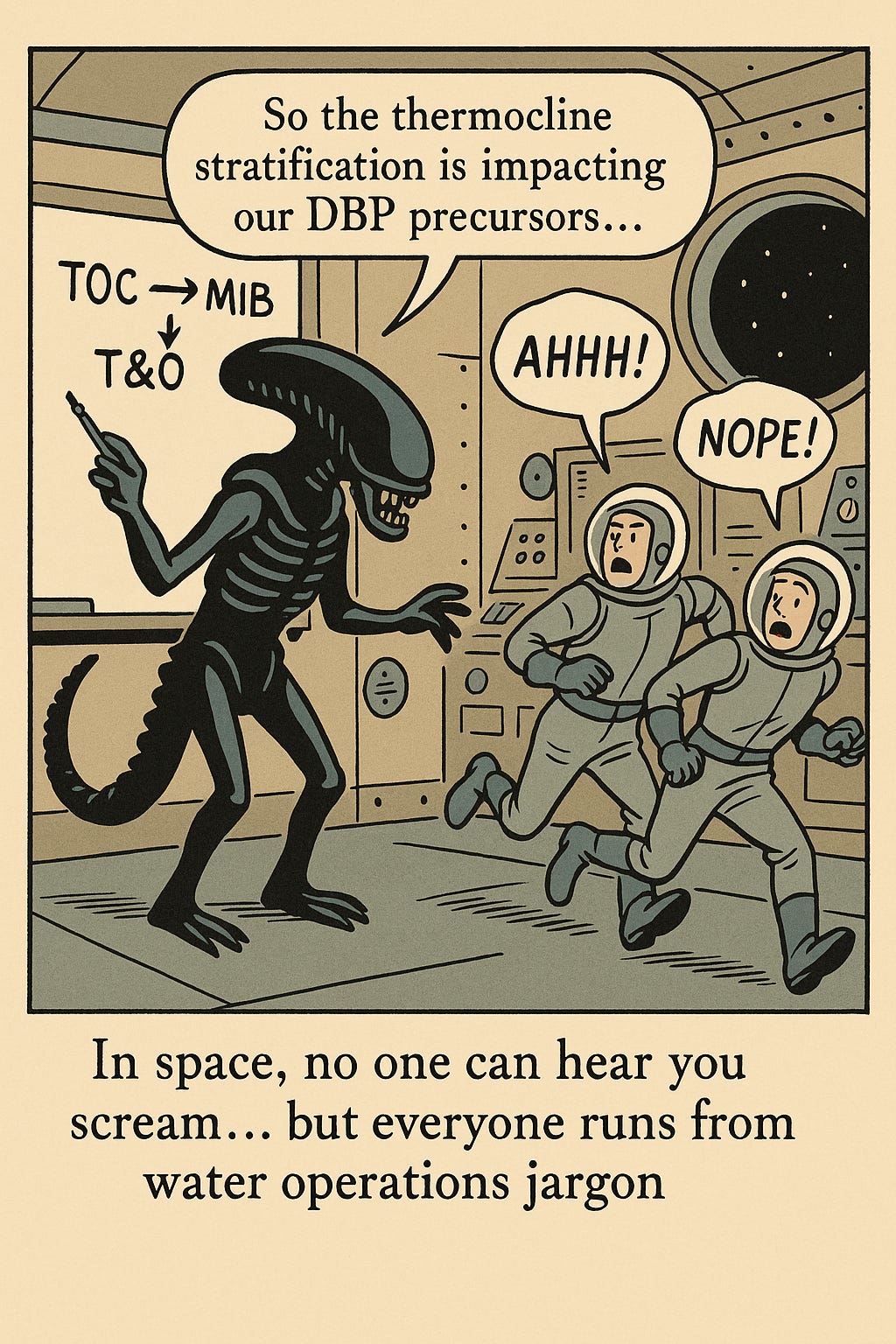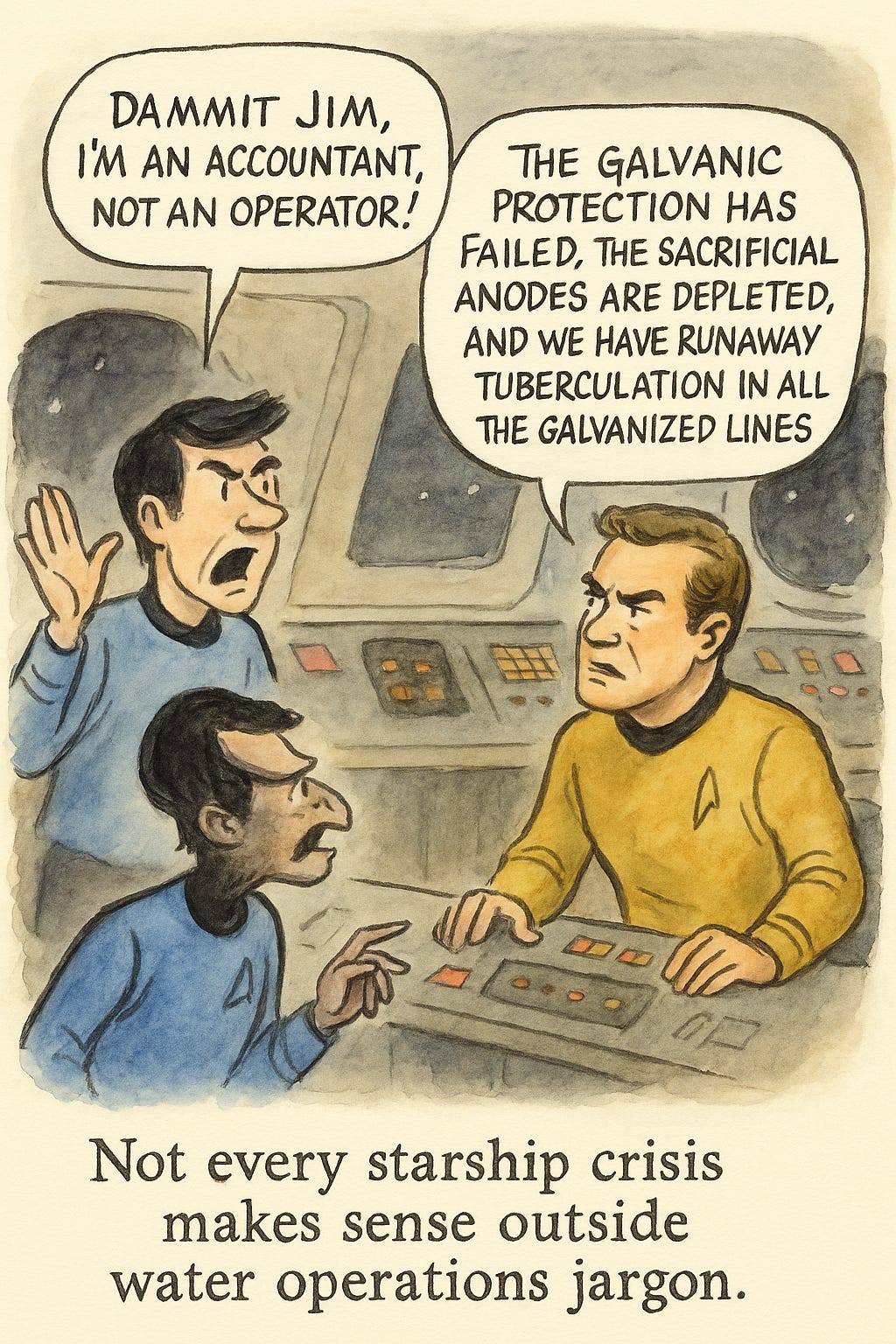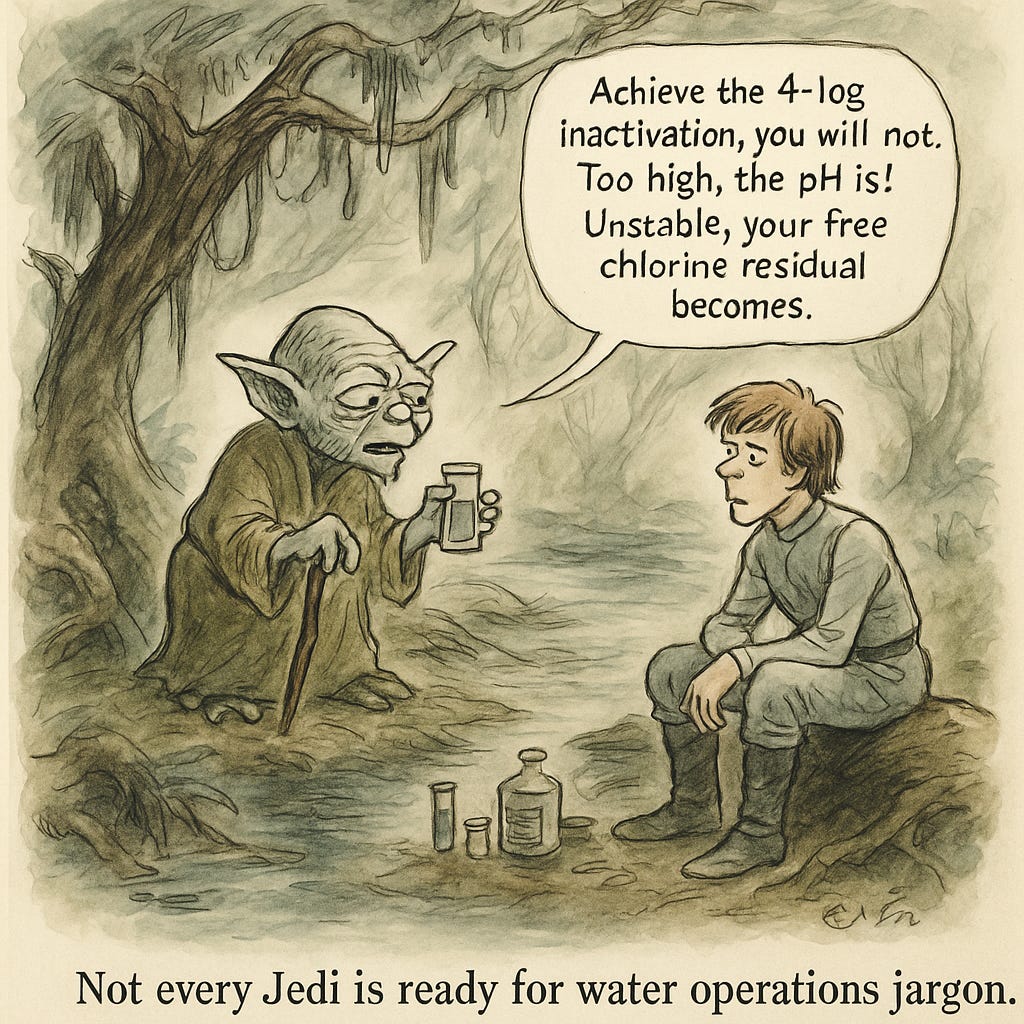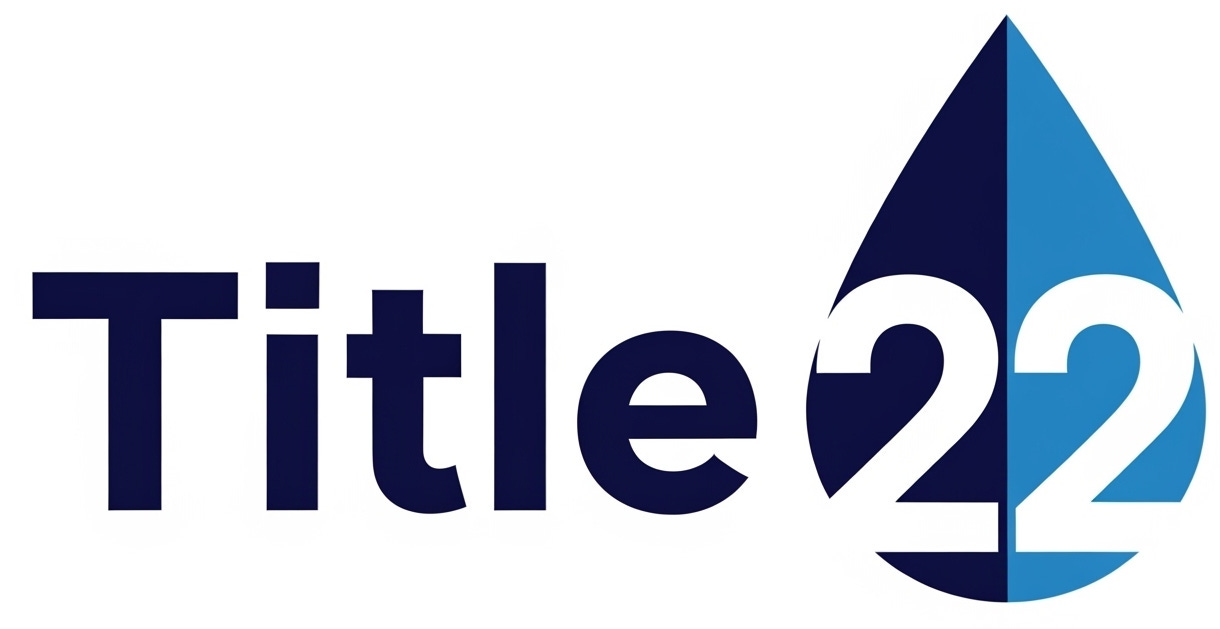The Jargon Tax
Why Your Operations Team Sounds Like They're from Another Planet
We’ve all met them. That certain type of engineer, manager, or chief wordsmith who seems to speak exclusively in a language of acronyms, hyper-technical concepts, and scientific terminology. I've encountered this person my entire career. At best, they're just completely unaware of their audience. At worst, it's a kind of pedantic showboating.
Now, don't get me wrong—I love precision, accuracy, and good data as much as the next person. But there's a time and a place. Technical terms are for technical discussions; they shouldn't be weapons used to make others feel small. Here’s a fun challenge: the next time your local jargon-slinger starts quoting 'log removal credits from the microbial toolbox' and 'CT values,' just politely ask them to explain what that actually means. If you have trouble following, it’s a safe bet others do, too. It’s also a great mental exercise to explain complex concepts in simple terms. Everybody learns.
This communication gap is the core of the problem. It's the reason good ideas get shot down and small problems become expensive crises. It’s a challenge so fundamental, in fact, that science fiction solved it decades ago.
On the bridge of any starship in our collective imagination, the captain can speak seamlessly with a newly discovered species from the far side of the galaxy. The secret is usually some form of universal translator, a magical piece of technology that instantly and perfectly decodes any language. It’s an optimistic and essential sci-fi trope: the belief that with the right tools, any two groups, no matter how different, can find common ground.
Back on Earth, in our own organizations, we are still waiting for our universal translator. We have our own collection of tribes, each with its own complex language. The operations department speaks a fluent dialect of "Technobabble," filled with talk of "headloss" and "SCADA integration." The finance department communicates exclusively in the clipped, logical tones of "Corp-speak," discussing "amortization" and "bond covenants." Our IT crew speaks a digital language of "Cyber-ese," focused on "network latency" and "firewall rules."
Each language is precise and efficient for communication within the tribe. But the moment these groups attempt a "first contact" mission (what we call a cross-functional project meeting), that efficiency becomes a tax. Without a universal translator, our attempts at collaboration often end in confusion, mistrust, and failure. This is the Jargon Tax: a levy on good ideas, paid in the currency of misunderstanding.
It’s a classic industry parable. An operations team needs to convince the finance committee to fund a critical pump upgrade. The chief operator makes a passionate, technically flawless case, explaining that the pump is experiencing severe "cavitation." They present detailed charts on "vibration analysis" and the "projected wear on the impeller." They are speaking the absolute truth in their native tongue. The finance team, hearing only an alien term, denies the request. Three months later, the pump fails catastrophically, and the emergency repair costs five times the original ask.
That story is a dramatic example, but often the tax isn't paid in a single, catastrophic failure. It's paid in the slow, grinding friction of daily work. I can tell you about one of those from personal experience. We once tried to purchase a replacement for a critical chemical feed pump. Accounting asked if it was "'new' equipment". Of course it's new, we're not getting a used pump. They denied the request and told us it had to wait for next year's budget proposal. After a long chain of confused emails, we finally diagnosed the problem. To accounting, "new" equipment meant a new system—a capital expense. We were doing a one-for-one replacement. We just needed to fill out an "equipment purchase" form that confirmed we weren't adding capital. Operations and accounting were not speaking the same language, and it cost us a decent amount of time. Now, we only have to re-explain it every six months. 😉
This isn't just a communication problem; it's a systems problem. In the absence of a magical translation device, we must recognize the most valuable person on any mission is the one who can act as the translator. In management theory, these people are called "Boundary Spanners," but a simpler, more powerful word is "translator." Their primary skill is standing at the border between two tribes and ensuring everyone understands each other.
A leader's primary mission is not just to command, but to translate—and to find others who can. Their job is to take the operator's "cavitation" and decode it for the finance team. The operator didn't need the finance team to understand the physics of vapor bubbles collapsing. He needed them to understand one simple, terrifying idea: "This pump is shaking itself to pieces and is about to explode."
A great translator doesn't just relay messages; they decode meaning. And these translators are probably hidden all around you. Look for the Susan who used to be a plumber and can explain to the new operator why they're risking water hammer with that valve sequence. Find the Juan who came from the water quality lab and can articulate why samples really need to get there before noon. And value Violet who used to teach kindergarten, because she's the one who knows how to talk to upper management.
Building this skill of translation is the highest form of leadership. It is a conscious effort to lower the Jargon Tax for your entire crew. It requires empathy: the ability to imagine how your words sound to a different tribe with a different worldview. It requires clarity: the discipline to strip an idea down to its universal, essential components. This doesn't mean "dumbing it down." It is the hard work required to build a shared consciousness.
So I challenge you to start listening for the moments where a translator is needed in your organization.
Then, accept your mission. The next time you're in a "first contact" situation, take it upon yourself to be the translator. Try using this simple formula:
U=i=1∑MJi2⋅Ai⋅Bi(Pi⋅Ci)⋅Ψ(t1)
Where U is Understanding, M is the length of the meeting in minutes, P is Project Urgency, C is Caffeine Level, J is Jargon Density, A is Audience Apathy, B is Budgetary Headwind, Ψ is a coefficient for psychological dread, and t is the time remaining until lunch.
You won't just be avoiding a tax. You will be building a bridge between worlds. You will be making it possible for your crew, united in understanding, to explore new frontiers of success.


